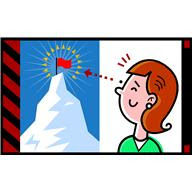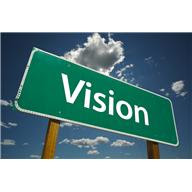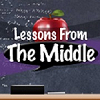With the next school year just off in the distance (don't worry it's still a ways off- but you can see it if you squint and tilt your head to the left) I'm going to take this time to talk about goal setting.
As teachers, we get the benefit of a fresh start with each new school year. It's a new beginning, not only for us, but for our students. It's important that we periodically assess how we're doing (both teachers and students) and think about what we'd like to improve to be more successful. Summer break is the perfect opportunity for teachers to take a bit of time, and really evaluate their previous year and choose a few things that they would like to work on in the following school year to improve their craft.

My personal "biggie" is around differentiation. I am always working on it and I always feel as though I could be doing more to include all of my learners, more of the time. Things get hectic and kids get lost - those at the bottom often get the most help, while those kids in the middle and definitely those at the top can get neglected if I'm not careful. I'm personally doing a lot of professional reading this summer, to try to gain some new ideas and strategies and also to show myself that I'm not doing a terrible job. There are lots of things that I'm doing right now that are great (well not RIGHT now...it's summer...right now I'm beaching with my boys...you know what I mean). I know that I'm like a lot of you out there - we're hard on ourselves! I don't know about you, but I want things to be done a certain way and I feel like I've failed when I haven't been able to get to "that" student.
Of course my goal needs to be more specific than "differentiation" and it is. I've got a working list of goals under construction, actually. As I'm reading, I note the REALLY good ideas - I mean the absolute KEEPERS. It's easy to get lost in a great resource and end up not actually doing anything that you read about because there was just too much! So, I've been keeping a list while reading each book (I've had a couple on the go this summer). When I get to the end, I have a look at the ideas and strategies that were note worthy and just take the top ones and those become my focus, until a new "number one" comes along.
So far, my number one is to make better use of Bloom's Taxonomy. Mind-blowing? No. Simple to do? Not as easy as one would think. I find that when my students are really struggling, I come down to them with more knowledge/comprehension type questions - just so that they may feel some success. The tricky part, is not spending too much time down there and being able to pull them up. So, to make better use of Bloom's Taxonomy by using menus, cubes, in my assignments and activities is one of my do-able goals for next year. It is a vital building block of my bigger goal - to differentiate more effectively.
Of course, I'm not alone in my classroom. Who am I doing all of this reading and thinking for anyway? My students!
During the first few days of school, I have my students also think about what their goals are for the school year. Do they want to improve their reading level, their spelling, finally learn their times tables? We need to put these goals into writing and share them if students feel comfortable - even post them in the room, if possible.
Think about it. If we're heading to a classroom every morning, but have no real idea about what we'd like to achieve while we're there, how much will we achieve? Perhaps some by accident. How much more could we have achieved with some thought, direction and ownership put into the task of goal-setting?
So, what goals do you have for the next school year and how can you help your students to identify theirs?
"Your goals are the road maps that guide you and show you what is possible for your life."
- Les Brown
 To help get you inspired, I made two Quote posters for you, available on Googledocs!
To help get you inspired, I made two Quote posters for you, available on Googledocs!


As teachers, we get the benefit of a fresh start with each new school year. It's a new beginning, not only for us, but for our students. It's important that we periodically assess how we're doing (both teachers and students) and think about what we'd like to improve to be more successful. Summer break is the perfect opportunity for teachers to take a bit of time, and really evaluate their previous year and choose a few things that they would like to work on in the following school year to improve their craft.
"All successful people have a goal. No one can get anywhere unless he knows where he wants to go and what he wants to be or do."
- Norman Vincent Peale
My personal "biggie" is around differentiation. I am always working on it and I always feel as though I could be doing more to include all of my learners, more of the time. Things get hectic and kids get lost - those at the bottom often get the most help, while those kids in the middle and definitely those at the top can get neglected if I'm not careful. I'm personally doing a lot of professional reading this summer, to try to gain some new ideas and strategies and also to show myself that I'm not doing a terrible job. There are lots of things that I'm doing right now that are great (well not RIGHT now...it's summer...right now I'm beaching with my boys...you know what I mean). I know that I'm like a lot of you out there - we're hard on ourselves! I don't know about you, but I want things to be done a certain way and I feel like I've failed when I haven't been able to get to "that" student.
Of course my goal needs to be more specific than "differentiation" and it is. I've got a working list of goals under construction, actually. As I'm reading, I note the REALLY good ideas - I mean the absolute KEEPERS. It's easy to get lost in a great resource and end up not actually doing anything that you read about because there was just too much! So, I've been keeping a list while reading each book (I've had a couple on the go this summer). When I get to the end, I have a look at the ideas and strategies that were note worthy and just take the top ones and those become my focus, until a new "number one" comes along.
So far, my number one is to make better use of Bloom's Taxonomy. Mind-blowing? No. Simple to do? Not as easy as one would think. I find that when my students are really struggling, I come down to them with more knowledge/comprehension type questions - just so that they may feel some success. The tricky part, is not spending too much time down there and being able to pull them up. So, to make better use of Bloom's Taxonomy by using menus, cubes, in my assignments and activities is one of my do-able goals for next year. It is a vital building block of my bigger goal - to differentiate more effectively.
Of course, I'm not alone in my classroom. Who am I doing all of this reading and thinking for anyway? My students!
During the first few days of school, I have my students also think about what their goals are for the school year. Do they want to improve their reading level, their spelling, finally learn their times tables? We need to put these goals into writing and share them if students feel comfortable - even post them in the room, if possible.
Think about it. If we're heading to a classroom every morning, but have no real idea about what we'd like to achieve while we're there, how much will we achieve? Perhaps some by accident. How much more could we have achieved with some thought, direction and ownership put into the task of goal-setting?
So, what goals do you have for the next school year and how can you help your students to identify theirs?
"Your goals are the road maps that guide you and show you what is possible for your life."
- Les Brown



No comments:
Post a Comment